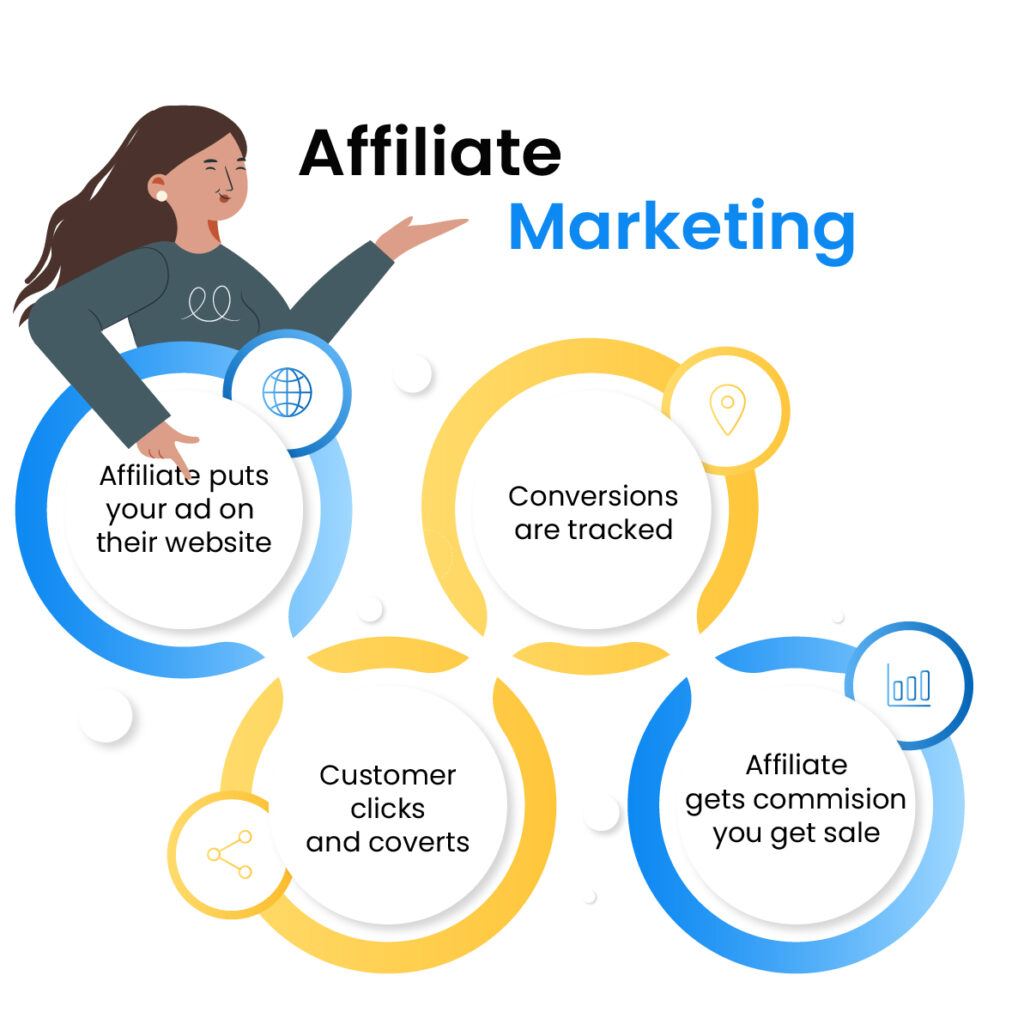It can sometimes be tough to find out just which marketing strategy you should use to drive sales to your business, right?
Not only do you have so many channels and methods to pick from, but there is also often some confusion about how some specific methods really work.
Take affiliate marketing vs. referral marketing, for example. A lot of people use those two terms interchangeably. They think that since both rely on asking other people to promote products or services, they are essentially the same thing.
In reality, referral marketing vs. affiliate marketing are two very different things. In a sense, you could say they don’t have anything in common! So, what is affiliate marketing, and what is referral marketing? Which one would be a better choice for you? Keep on reading – we’ll give you an overview of both methods and explain how each of them actually works.
What are the main similarities between referral marketing and affiliate marketing?
Why do these two terms get confused so often? The main feature of both programs is that you rely on others to promote your business by spreading the word about it. As with many businesses, the goals are the same; you want to make sure that your website is visited, that people make purchases, and that your business is well known. And both affiliates and your loyal customers will be happy to spread the word in exchange for a small gift (or just a “thank you”) or a commission fee. But to bring other people to your business, both groups need to build trust first. You could say that trust is the basis of both affiliate and referral marketing.
That’s the end of the similarities, though – everything else is vastly different. Let’s now examine the difference between referral and affiliate marketing.
What is referral marketing?
A referral program is all about encouraging your existing customers or users to promote your brand in exchange for small rewards. And in the majority of cases, your customers will be happy to do so. They can write a glowing review about your product, show photos from stores on their social media profiles, or tell their family and friends about that new fantastic hairstylist they went to.
A referral program vs affiliate program often highlights how referral programs encourage your existing customers to promote your brand in exchange for small rewards.
They don’t even need to get anything out of it. They want to share their joy and help a friend or colleague solve a problem. And hearing a good word from a friend or a family member naturally makes other people want to try out that product or service. After all, if their friends already tried it out and had a great experience then there’s a good chance the product or service is worth using.
To encourage customers to tell even more people about a product they love using or a place they often visit, it is common to participate in an “Invite your friends” incentive program. These are available in almost all types of businesses,

They’re super simple – while using an app or product, customers or users can get a unique referral link or code to share with others. After the person clicks on the link and makes a purchase, the referring customer and the customer who made the purchase are both rewarded.
The rewards vary depending on the type of business. It could be a complimentary service like Uber does by giving a free ride to you and a person who you recommend the app to, or it may be a free service upgrade like Dropbox and Tunnelbear offer. Discounts, store points, free products, and gift cards are also often given as rewards.
How do referrals work in practice?
Here’s a story to show you how referrals work in practice. I’m scared of all dentists. Hearing that I need to visit a dental clinic, a family friend gave me the address of the dental clinic where she goes with her children. All of the staff there are so patient and kind when taking care of her kids that they actually look forward to their check-ups! So, trusting the word of someone who has been going to the clinic for years, I booked a visit there as well.
She was telling the truth – the staff did an excellent job explaining everything to me and making sure I was okay throughout the whole process. So now I recommend the clinic as well and I also wrote an online review. It was written from the perspective of a patient who was scared of the dentists but doesn’t fear check-ups as much anymore, thanks to some very patient and kind staff.
See how it went? I went to the clinic first after hearing about it from a friend who said her children adore the staff there. After my visit, I also started spreading the good word about the dentists there. I recommend the clinic whenever someone mentions that they are looking for a dentist and also wrote an online review praising the staff.
Initially, I didn’t even get anything out of the recommendations – it was enough for me to help someone having the same issue. However, after the staff noticed that they were getting more patients who made appointments after reading positive reviews, they offered a discount for my services and have now posted my review on their website. So they have a self-perpetuating marketing machine without even having to hire a marketer, as I and other patients promote the clinic for them.
What is affiliate marketing?
Now let’s get into details about the second type – affiliate marketing.
It’s a marketing strategy in which brands rely on marketers to promote their products or services and then pay for the results that these affiliates bring. It sounds pretty similar to referrals, right? The difference lies in who the affiliates are and what they do.
This method allows affiliates to reach a broader audience beyond personal networks. The key referral vs. affiliate difference is that affiliates use their content creation platforms, like blogs and social media, to promote products, whereas referrers rely on word-of-mouth.
It is possible for anyone interested in earning some extra income through promoting a product or service to become an affiliate. Even if they aren’t your customers, they are often welcome to take part in affiliate programs as well. What’s more, while your referrers only spread the word about your brand or product with people they know, your affiliates have wider audiences consisting of their social media account followers or blog readers, for example. That gives affiliates more ways to reach people who are interested in a given product or service. However, it also requires more effort, especially if they are starting from scratch without a stable audience.
You also should know that while your referrers are happy to say a few good words about your business because they like what you do, your affiliates are there for the money. They know that affiliate marketing is performance-based, which means that the more customers they can bring to your business, the more they will earn. But that can lead some marketers to take some pretty shady actions, so you need to be very careful when hiring people for your affiliate program.
How does an affiliate marketing program work in practice?
The basics of affiliate marketing are simple. Your affiliates create content for their blogs, social media profiles, or video channels centered around their hobbies or niche interests. Such content might be a review of a product they have recently used or a place they have visited. It may also be a comparison or a list of products they love using – with a (or several) chosen product or service being the one they promote as affiliates. There’s also a unique affiliate link inserted somewhere in the content, through which their followers can check out the items that are being recommended. Once someone purchases a product or service through that link, the affiliate then earns commission. The commission is a small sum of money that is either a percentage of the sale amount or a flat fee.

Why should you use affiliate marketing?
Affiliate marketing can be pretty beneficial both for you and your marketers. For you, the biggest advantage of an affiliate program is that there’s almost no financial risk on your side. This is because you will pay your affiliates commission only once they bring the desired results, for example driving more sales.
Another great benefit of this method is that it can lead you to people (or companies) that perfectly match your product or service. All you need to do is find a blogger or influencer who is interested in the subject matter. So, for instance, if you sell health supplements then starting a partnership with a YouTuber who makes fitness videos might be exactly what you need to boost sales.
Conclusion
There are many reasons why you should use referral vs. affiliate marketing programs to promote your business. Both can help you bring more people to your company and increase sales without making a dent in your budget. The way they work, however, is fundamentally different. Referral marketing relies on customers who know and love your business, whereas affiliate marketing requires you to search for talented marketers first. In general, bloggers or social media influencers from your niche can give you far better outreach as they are active on multiple channels.
Thus, it depends on what type of customers you’re hoping to reach with your business which of these two methods would be the most effective. Or pehaps to use both of them simultaneously? Give it some thought!
Share this article
How To Find Affiliates to Sell Your Products
Discover over 10 successful strategies for finding high-quality affiliates in 2024 to boost your product sales. Learn to leverage influencers, join affiliate networks, and enhance your reach through SEO and social media. Maximize revenue with transparency and ongoing monitoring in your affiliate marketing program.
Discover the essential role of affiliate software in managing and optimizing your affiliate marketing programs. Learn how it streamlines link tracking, referral management, and commission payments, ensuring data security and fraud prevention. Unlock growth opportunities with efficient program management and boost your business's reach and ROI. Visit now to explore the benefits of investing in affiliate software!
Explore Post Affiliate Pro's comprehensive Affiliate Marketing Glossary to enhance your industry knowledge with easy-to-understand definitions of essential terms. Perfect for marketers seeking to understand the fundamentals and advanced concepts, this glossary helps you master the language of affiliate marketing. Visit now to boost your expertise!
Affiliate marketing email templates
Discover expertly crafted email templates for affiliate marketing with Post Affiliate Pro. Enhance your communication by motivating, acknowledging, and engaging affiliates effectively. From terms and conditions to product launches, these templates ensure clear and consistent messaging to boost your affiliate program's success. Visit now to streamline your affiliate communication!
6 reasons to use a third-party affiliate management system
Discover the top 6 reasons to invest in a third-party affiliate management system. Simplify your affiliate marketing with automated tracking, fraud detection, and user-friendly solutions that save time and reduce costs. Boost your business's efficiency and gain more control over your affiliate programs today.
How to keep your affiliates happy with split commissions
Discover how Post Affiliate Pro's SplitCommission™ feature can boost affiliate motivation and engagement by fairly distributing commissions among all contributors to a sale. Learn how to implement this innovative model to enhance your affiliate program's success.












